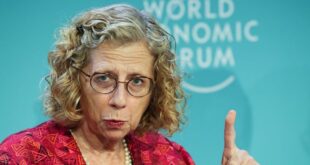BUENOS AIRES (Reuters) -Argentina’s markets face an election hangover on Monday after a shock primary election win for far-right libertarian Javier Milei, who wants to axe the central bank and dollarize the economy, shook up the race towards general elections in October.
Rock-singing, wild-haired economist Milei far outperformed forecasts to get some 30% in the vote with over 90% of ballots counted, the largest vote share. The primary to elect party candidates acts as a dress rehearsal for the general election in two months time.
Markets had hoped for a strong performance by more moderate candidates, who had a bad night. That could weaken the peso currency in popular parallel markets on Monday and weigh on bonds which have risen in recent weeks.
“The market did not expect these numbers from Milei. I think the government will have to be very attentive to the exchange market, it will surely be a week with a lot of tension,” said Dante Sica, a consultant and former production minister.
Argentina’s markets have long been wobbly with years of economic crisis. After a similar primary election shock result in 2019, bonds and the currency crashed and remain in distressed territory, with the peso now held in check by capital controls the government has been unable to unwind.
Milei’s win adds an extra unknown factor that could dent market confidence, though that could be tempered by the fact he still faces a tough fight in October and a likely November run-off, which would test his ability to win over more voters.
Goldman Sachs said in a note before the vote that Milei backs more “radical policy proposals” including dollarization and sharp spending cuts, and brought some uncertainty given his lack of an established political machine.
He will compete in a three-way race in October against former security minister Patricia Bullrich, who won the main conservative Together for Change nomination, and Peronist coalition candidate Economy Minister Sergio Massa.
A candidate needs 45% of the Oct. 22 vote to win outright or 40% and a 10-point lead over second place. If there is no outright winner, as seems likely, a head-to-head vote between the top two candidates will be held in November.
“What we are left with is a much more uncertain scenario than the one we expected,” said Ricardo Delgado, director of the Argentine economics consultancy Analytica.
(Reporting by Eliana Raszewski; Additional reporting by Jorge Otaola; Writing by Adam Jourdan; Editing by Stephen Coates)
 BeritaKini.biz Berita Viral Terkini di Malaysia
BeritaKini.biz Berita Viral Terkini di Malaysia





